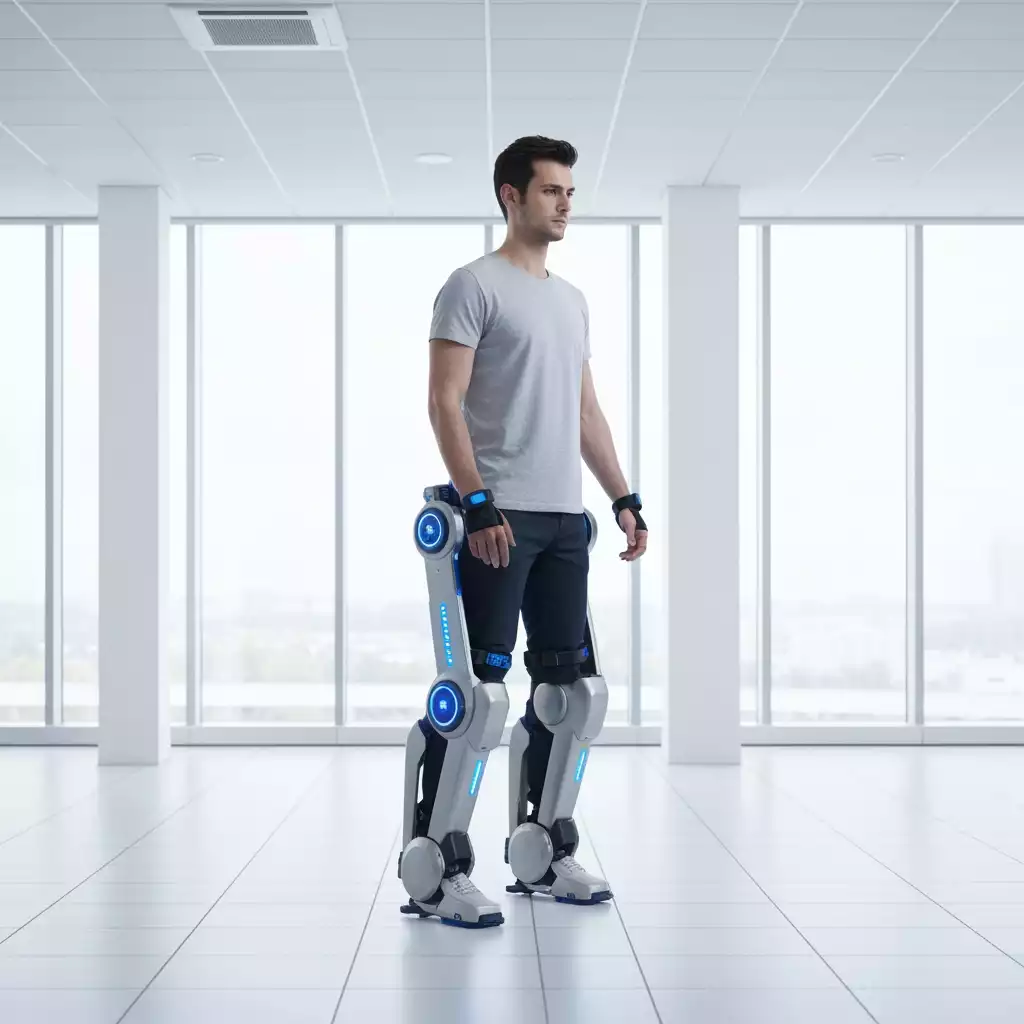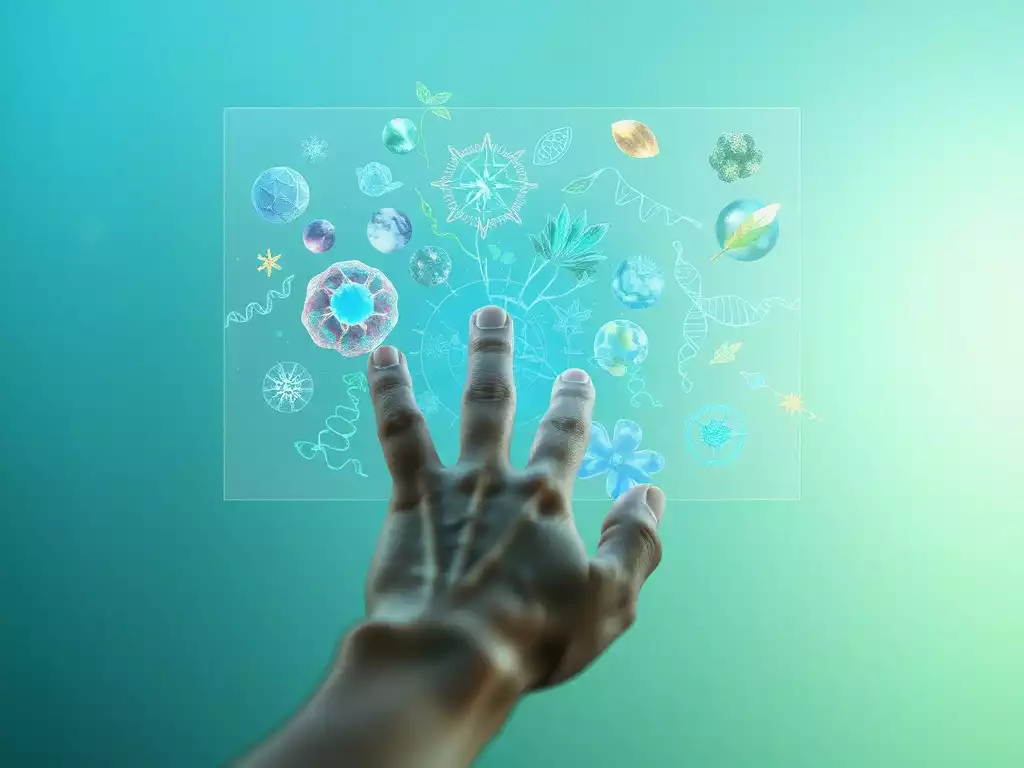From advancements in technology to personalized health solutions, the field of Augmented Biology is reshaping our understanding of life and health. As we navigate this innovative landscape, here are the key insights you will gain.
What You Will Learn
- Augmented Biology merges biological processes and technology to enhance human capabilities.
- AI is revolutionizing health analytics, enabling predictive solutions for disease prevention and personalized treatments.
- Wearable robotics are transforming health and performance, providing support for mobility and rehabilitation.
- The future of Augmented Biology promises personalized medicine, potentially leading to better health outcomes and increased life expectancy.
- Community engagement is essential for advancing augmented biology, with opportunities to participate in workshops and research projects.
Augmented Biology: Differentiating Fields & Technology’s Role
Augmented Biology integrates technology to enhance biological functions. This visual clarifies its distinctions from related fields and highlights key technological applications.
Distinction: Synthetic Biology
Focuses on creating *new* biological systems, redesigning organisms for specific purposes (e.g., bacteria producing medicine).
Key: Creation of New Systems
Distinction: Biohacking
DIY movement; individuals use science/tech for personal biological enhancement (e.g., dietary changes, self-experimentation).
Key: Personal Experimentation
Tech Role: AI Integration
Analyzes data for predictive health, personalized solutions, disease prevention, and drug discovery (e.g., smart health apps).
Key: Data Analysis & Prediction
Tech Role: Wearable Robotics
Enhances physical abilities and mobility (e.g., exoskeletons for rehabilitation, smart prosthetics for natural movement).
Key: Physical Enhancement

Understanding Augmented Biology: A Comprehensive Definition
Augmented Biology is an exciting intersection of technology and life sciences. At its core, it merges biological processes with modern innovations to enhance human capabilities and improve overall health. In simpler terms, it’s about using technology to optimize biological functions, leading to advancements that can transform how we approach health, fitness, and longevity!
This concept invites us to rethink traditional biology, showcasing how we can integrate digital tools with biological insights to create a more improved version of ourselves. It’s about harnessing the power of science to not just understand life but to enhance it.
What is Augmented Biology?
Augmented Biology refers to the application of technologies, such as AI and robotics, that enhance biological functions. This can include anything from smart wearable devices that monitor our health to genetic modifications that improve our physical performance. By blending biology with technology, we can achieve outcomes that were once thought to be science fiction!
- Integration of AI for predictive health analytics
- Development of smart wearables that provide real-time data
- Innovative approaches to genetic engineering
These advancements allow us to push the boundaries of what it means to be human. It’s inspiring to see how these technologies can elevate our daily lives and improve our health outcomes!
Differentiating Augmented Biology from Related Fields
In order to truly grasp Augmented Biology, it’s essential to distinguish it from similar fields that might overlap or seem closely related. This helps clarify its unique contributions and applications. Let’s delve into some of the key areas that connect with but are distinct from Augmented Biology.
Exploring Synthetic Biology
Synthetic Biology is a branch of science that involves redesigning organisms for useful purposes by engineering them to have new abilities. While Augmented Biology focuses on enhancing existing biological capabilities, synthetic biology often starts with creating entirely new biological systems. The two fields can collaborate, but they cater to different end goals.
Understanding Biohacking
Biohacking, often seen as a DIY biology movement, involves individuals using science and technology to enhance their own biology. This can include anything from dietary changes to using technology for self-experimentation. While biohacking emphasizes personal experimentation, Augmented Biology is more about systematic applications of technology across broader contexts.
Biological Augmentation: Enhancing Natural Functions
Biological Augmentation specifically refers to the techniques and technologies used to enhance the natural functions of living organisms. This can manifest in various ways, including performance enhancement through wearable technology or genetic modifications that increase resistance to diseases. The goal here is to improve biological capabilities without completely altering the organism’s fundamental nature.
The Role of Technology in Augmented Biology
As we continue to explore the depths of Augmented Biology, it’s crucial to recognize the role that technology plays in its advancement. From artificial intelligence to wearable tech, innovations are at the forefront of this transformative field.
Technology not only aids in the enhancement of biological functions but also makes these advancements more accessible and user-friendly. Every day, new technologies emerge, bridging the gap between biology and our everyday experiences!
Integrating AI in Biology: Enhancements and Innovations
Artificial Intelligence (AI) is rapidly changing the landscape of Augmented Biology. Its ability to analyze vast amounts of data helps us understand biological systems better and create personalized health solutions. AI-driven tools can predict health trends, streamline research, and even assist in diagnosis!
- AI-powered health monitoring applications
- Predictive analytics for disease prevention
- Machine learning algorithms in drug discovery
This integration not only enhances the effectiveness of biological applications but also paves the way for future innovations that can drastically improve our quality of life.
Wearable Robotics: Transforming Health and Performance
Wearable robotics represent a significant leap forward in augmenting physical abilities. Devices like exoskeletons or robotic limbs can assist those with mobility challenges, allowing them to regain independence and improve their quality of life. These technologies illustrate the potential of Augmented Biology to truly transform lives!

Applications of Wearable Robotics in Daily Life
Everyday applications of wearable robotics can be seen in various sectors, from rehabilitation therapies to enhancing workplace productivity. These devices can:
- Assist in physical therapy recovery
- Support elderly individuals in maintaining mobility
- Enhance athletic performance through training aids
With ongoing advancements, the future of wearable robotics is bright and holds the promise of further empowering individuals.
Smart Prosthetics: Redefining Mobility
Smart prosthetics are a revolutionary aspect of Augmented Biology, offering users enhanced functionality and adaptability. These high-tech devices adapt to the user’s movements, providing a more natural experience. By integrating sensors and AI, smart prosthetics can learn from the user’s behavior, making them a game-changer in mobility and rehabilitation.
Pro Tip
Did you know? Engaging with augmented biology technologies like wearable devices can provide not only health insights but also empower you to take charge of your wellness journey. Regularly monitoring your health metrics can help you spot trends early and make informed decisions for a healthier lifestyle!
Looking Ahead: The Future of Augmented Biology
The future of augmented biology is filled with promise and potential. As we dive deeper into this field, we are likely to witness transformations in both society and health. From personalized medicine to revolutionary therapies, the innovations stemming from augmented biology are poised to reshape our understanding of health and wellness. With advancements in technology, we can expect more tailored solutions that fit individual needs!
One of the most significant impacts will be on how we approach healthcare. Imagine a future where treatments are not just standardized but are customized for each person’s genetic makeup. This personalized approach could lead to better outcomes and fewer side effects, which is something I’m particularly excited about!
Potential Impacts on Society and Health
As augmented biology evolves, it will bring several potential impacts that we must consider. Here are some key areas where we can expect significant changes:
- Increased Lifespan: With enhanced medical treatments, people may live longer, healthier lives.
- Access to Personalized Treatments: Tailored therapies based on genetic profiles could become the norm.
- Better Disease Prevention: Predictive analytics might help identify health risks before they become serious issues.
- Enhanced Quality of Life: Improved health monitoring and wearable technologies can lead to an overall better lifestyle.
These developments in augmented biology will not only change individual lives but also have a ripple effect on society as a whole, shaping healthcare policies and practices.
Engaging with the Community: Opportunities for Participation
Engagement with the community is crucial for the growth of augmented biology. There are numerous ways individuals can participate and contribute to this exciting field. By getting involved, you can help shape the future direction of health technologies!
- Participate in Local Workshops: Join workshops or seminars focused on augmented biology to learn and network.
- Volunteer for Research Projects: Many universities and organizations seek volunteers for clinical trials and research initiatives.
- Join Online Forums: Engage with online communities discussing the latest in augmented biology and share your thoughts.
- Advocate for Ethical Practices: Be part of discussions surrounding the ethics of genetic engineering and biotechnology.
By engaging in these activities, you can help contribute to the ongoing conversations and developments in augmented biology!
Future Directions in Personalized Medicine and Genetic Therapies
Looking ahead, personalized medicine and genetic therapies are at the forefront of augmented biology. Innovations in these areas are likely to transform how we view treatment and recovery. For instance, advancements in CRISPR technology may allow for precise gene editing, offering cures for previously incurable genetic disorders.
Moreover, as we refine our understanding of the human genome, the potential for creating personalized medications tailored to an individual’s genetic makeup becomes increasingly feasible. It’s an exciting time to explore these advancements, and I encourage you to keep an eye on how they will influence our future in health and wellness!
Recap of Key Points
Here is a quick recap of the important points discussed in the article:
- Augmented Biology: Merges technology with biological processes to enhance human capabilities and health.
- Role of AI: Artificial Intelligence facilitates predictive health analytics and personalized solutions.
- Wearable Robotics: Transform health and performance through devices that assist mobility and enhance physical abilities.
- Personalized Medicine: Future treatments may be tailored to individual genetic profiles for better health outcomes.
- Community Engagement: Participation in workshops, research, and discussions can help shape the future of augmented biology.
Frequently Asked Questions about Augmented Biology
Q: What is the core definition of Augmented Biology?
A: Augmented Biology merges biological processes with modern technology to enhance human capabilities and improve overall health. It uses technology to optimize biological functions.
Q: How does Augmented Biology differ from Synthetic Biology?
A: While Augmented Biology focuses on enhancing existing biological capabilities, Synthetic Biology often involves creating entirely new biological systems or redesigning organisms for specific purposes.
Q: What role does AI play in Augmented Biology?
A: AI analyzes vast amounts of biological data to predict health trends, streamline research, assist in diagnosis, and create personalized health solutions, thereby enhancing the effectiveness of biological applications.
Q: How are wearable robotics transforming health and performance?
A: Wearable robotics, such as exoskeletons and smart prosthetics, augment physical abilities, assist with mobility challenges, aid in rehabilitation, and enhance athletic performance, significantly improving quality of life.
Q: What are the potential future impacts of Augmented Biology on society and health?
A: The future of Augmented Biology promises personalized medicine, increased lifespan, better disease prevention through predictive analytics, and an enhanced quality of life through improved health monitoring and tailored treatments.
